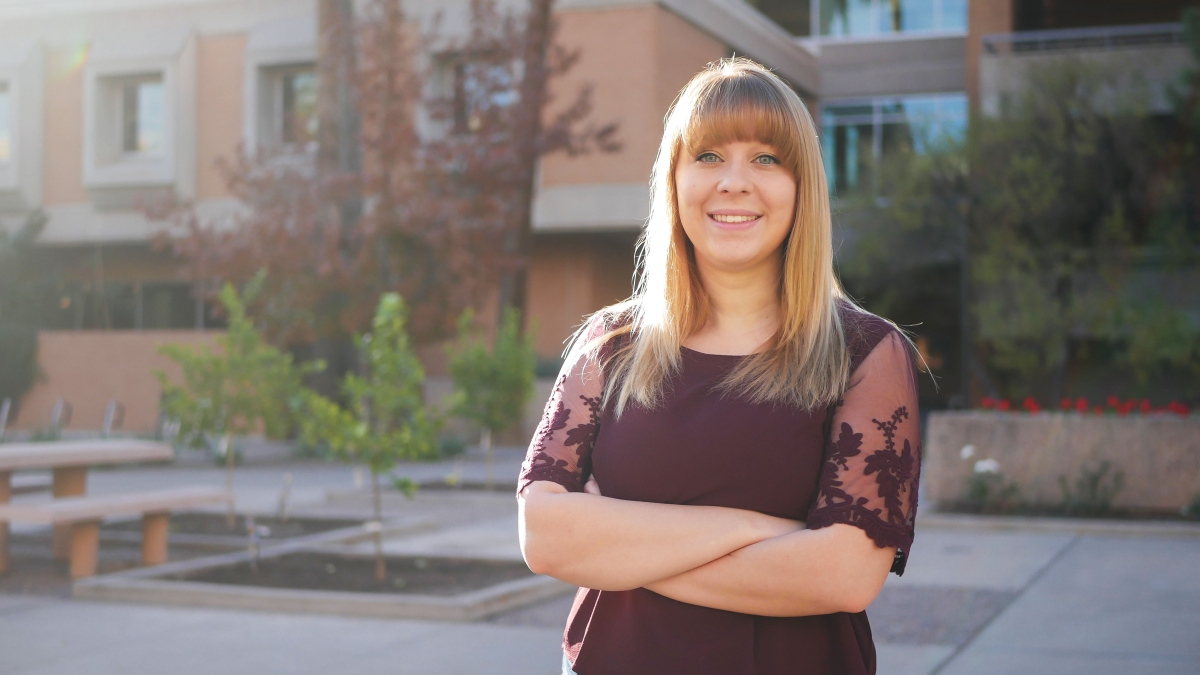ASU psychology dean's medalist works to eliminate stigma around mental health

Ariana Ruof, Dean's Medalist, ASU Department of Psychology standing in front of the Psychology Building. Photo: Robert Ewing
Editor’s note: This is part of a series of profiles for fall 2017 commencement. See more graduates here.
Each semester, the College of Liberal Arts and Sciences at Arizona State University recognizes one student per department as a Dean's Medalist. The award is based on academic performance but also for being a great example of what you can accomplish when you find your true passion and go all in. Ariana Ruof, a senior in the Department of Psychology, received the prestigious honor for the fall 2017 semester.
Ruof graduated with both a bachelor's of science in psychology, and a bachelor's of science in family and human development and she worked in two research labs, the Arizona Twin Project and the Social Addictions Impulse Lab (SAIL lab).
As the lab manager of the SAIL lab, Ruof studied impaired control as it related to alcohol use in college students and members of the community. The goal of her research project was to better understand impulsivity, stress and other behaviors related to alcohol use.
While in the ASU Department of Psychology, Ruof has earned many other awards, including the New American University President’s Scholarship and the Zita M. Johnson Child Study Scholarship. On top of that, she founded the Psychology Engagement Team and helped create Mental Health Awareness Week at ASU, for which she received a Cooley Leadership and Service grant.
“Ariana demonstrates natural leadership skills and a sense of service. She can organize a small army of people to mobilize toward a common goal in a short period of time. Ariana Ruof is truly an exemplary student overall and truly worthy of the Dean's Medal,” said the nomination committee from the Department of Psychology.
All of her success has not gone to her head, thanks in part to her family. When Ruof left for ASU, her parents made the choice to help improve the lives of children who were less fortunate and became foster parents.
“Along with my research experience, interacting with foster children led me to be interested in the genetic and environmental influences of child development and family processes,” Ruof said.
Like her many awards, Ruof had many choices for college. She applied widely, to Stanford University, Harvard University, San Diego State University, and the University of California at San Diego but chose ASU for proximity to family and undergraduate opportunities in research.
"In the Barrett Honors College, I received a high-level education similar to what I would have had at an Ivy League school, but I was able to save a lot of money."
Question: What was your “aha” moment, when you realized you wanted to study the field you majored in?
Answer: I don’t feel like I had a single “aha” moment that led me to my field of interest; however, there were some key moments. In high school, I had always thought I wanted to be a teacher but I also had a deep interest in science, specifically when it came to learning about the brain. My mother was the one who encouraged me to look into psychology.
Working with the Boys & Girls Clubs also made me realize I was particularly interested in child development and family processes, which led me to focus on Developmental Psychology and Family and Human Development.
Q: What’s something you learned while at ASU — in the classroom or otherwise — that surprised you, that changed your perspective?
A: During the summer before my junior year, I decided to study abroad with Barrett, The Honors College in Italy for three weeks. This trip was the first time I had ever been out of the country and the first time I took a trip by myself, as I did not know any of the other students. This experience taught me a lot about other people, other cultures and my own identity. The classes I was taking and being in a foreign country were both experiences unlike anything else I had done as an undergraduate.
Q: What was your favorite spot on campus, for studying, meeting friends or just thinking about life?
A: I’m not really sure why, but I have always liked the courtyards near the Student Services building. I feel like this area of campus is quieter and kind of peaceful with the shade from the trees but it is still close enough to busier areas of campus like the MU.
Q: What are your plans after graduation?
A: Before my PhD program starts in the fall, I will be working in the Social Addiction Impulse Lab (SAIL) and Arizona Twin Project (ATP). Both labs have given me part-time jobs. In SAIL, I will continue to be lab manager and in ATP I will be the iMotions coordinator and will run a coding team. In the fall, I will be starting a PhD program in Family and Human Development here at ASU with Kit Elam on projects related to genetics, child self-regulation and family processes.
Q: If someone gave you $40 million to solve one problem on our planet, what would you tackle?
A: This question is really tough because there are two things I am really passionate about. The first is eliminating the stigma surrounding mental health and giving better, more local access to more specialized mental health resources for people. I spent a lot of time as an undergraduate working towards this effort with my club, the Psychology Engagement Team. As a junior, I had spearheaded a Mental Health Awareness Week and brought the ASU Tempe campus and the Tempe community together to raise awareness for resources for various mental health disorders, such as anxiety and depression. I would probably use the money to continue efforts such as this that aim to reduce the stigma surrounding mental health.
My other passion is making sure children understand the importance of higher education and that even though they may come from an underprivileged background, they can still get a higher education to improve their lives. As a sophomore and a junior, I worked with a student organization called SPARKS and we traveled all over Arizona and southern California speaking to K-12 students at low-income schools and at Boys & Girls Clubs about how they have opportunities to gain higher education. I would also use the money to promote efforts to give educational access and opportunities to these students.
More Science and technology

Compact X-ray laser lab aims to reveal deep secrets of life, matter and energy
X-rays allow us to view inside the human body to diagnose broken bones and other hidden problems. More recent X-ray advances are…

Apollo lunar samples enable ASU researcher to pinpoint moon’s crystallization timeline
A team of researchers, including Arizona State University geochemist Melanie Barboni, in collaboration with scientists from The…

NASA launches space telescope to chart the sky and millions of galaxies
California’s Vandenberg Space Force Base was the site for Tuesday’s 8:10 p.m. launch of the NASA SPHEREx mission aboard a SpaceX…

